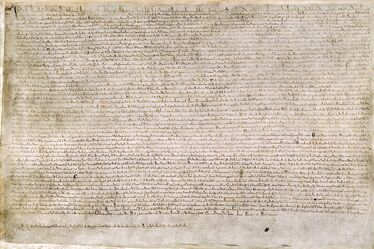
Magna Carta originated as an unsuccessful attempt to achieve peace between royalist and rebel factions in 1215, as part of the events leading to the outbreak of the First Barons' War. England was ruled by King John, the third of the Angevin kings. Although the kingdom had a robust administrative system, the nature of government under the Angevin monarchs was ill-defined and uncertain. John and his predecessors had ruled using the principle of vis et voluntas, or "force and will", taking executive and sometimes arbitrary decisions, often justified on the basis that a king was above the law. Many medieval philosophers believed that monarchs should rule in accordance with the custom and the law, with the counsel of the leading members of the realm, but there was no model for what should happen if a king refused to do so.
John had lost most of his ancestral lands in France to King Philip II in 1204 and had struggled to regain them for many years, raising extensive taxes on the barons to accumulate money to fight a war which ended in expensive failure in 1214. Following the defeat of his allies at the Battle of Bouvines, John had to sue for peace and pay compensation. John was already personally unpopular with many of the barons, many of whom owed money to the Crown, and little trust existed between the two sides. A triumph would have strengthened his position, but in the face of his defeat, within a few months after his return from France, John found that rebel barons in the north and east of England were organizing resistance to his rule.
The rebels took an oath that they would "stand fast for the liberty of the church and the realm", and demanded that the King confirm the Charter of Liberties that had been declared by King Henry I in the previous century, and which was perceived by the barons to protect their rights. The rebel leadership was unimpressive by the standards of the time, even disreputable, but were united by their hatred of John. Robert Fitzwalter, later elected leader of the rebel barons, claimed publicly that John had attempted to rape his daughter, and was implicated in a plot to assassinate John in 1212.
John held a council in London in January 1215 to discuss potential reforms, and sponsored discussions in Oxford between his agents and the rebels during the spring. Both sides appealed to Pope Innocent III for assistance in the dispute. During the negotiations, the rebellious barons produced an initial document, which historians have termed "the Unknown Charter of Liberties", which drew on Henry I's Charter of Liberties for much of its language; seven articles from that document later appeared in the "Articles of the Barons" and the subsequent charter.
It was John's hope that the Pope would give him valuable legal and moral support, and accordingly John played for time; the King had declared himself to be a papal vassal in 1213 and correctly believed he could count on the Pope for help. John also began recruiting mercenary forces from France, although some were later sent back to avoid giving the impression that the King was escalating the conflict. In a further move to shore up his support, John took an oath to become a crusader, a move which gave him additional political protection under church law, even though many felt the promise was insincere.
Letters backing John arrived from the Pope in April, but by then the rebel barons had organized into a military faction. They congregated at Northampton in May and renounced their feudal ties to John, marching on London, Lincoln, and Exeter. John's efforts to appear moderate and conciliatory had been largely successful, but once the rebels held London, they attracted a fresh wave of defectors from the royalists. The King offered to submit the problem to a committee of arbitration with the Pope as the supreme arbiter, but this was not attractive to the rebels. Stephen Langton, the archbishop of Canterbury, had been working with the rebel barons on their demands, and after the suggestion of papal arbitration failed, John instructed Langton to organize peace talks. These eventually resulted in John agreeing, under duress, to place his seal upon Magna Carta on June 15.
 RSS Feed
RSS Feed